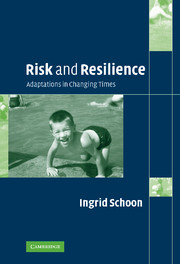Book contents
- Frontmatter
- Contents
- List of figures
- List of tables
- Foreword by Glen H. Elder, Jr
- Preface by John Bynner
- Acknowledgements
- Introduction
- 1 Risk and resilience: definitions
- 2 Towards a developmental-contextual systems model of adjustment
- 3 Persisting inequalities in times of social change
- 4 Selection, causation and cumulative risk effects
- 5 Protective factors and processes
- 6 Stability of early adjustment over time
- 7 Personal goals and life plans
- 8 Conclusions and outlook
- 9 Implications of findings for interventions and social policy
- Appendix A Two British birth cohorts
- Appendix B Response rates and handling of missing data
- Appendix C Description of variables used in the study
- References
- Index
3 - Persisting inequalities in times of social change
Published online by Cambridge University Press: 22 September 2009
- Frontmatter
- Contents
- List of figures
- List of tables
- Foreword by Glen H. Elder, Jr
- Preface by John Bynner
- Acknowledgements
- Introduction
- 1 Risk and resilience: definitions
- 2 Towards a developmental-contextual systems model of adjustment
- 3 Persisting inequalities in times of social change
- 4 Selection, causation and cumulative risk effects
- 5 Protective factors and processes
- 6 Stability of early adjustment over time
- 7 Personal goals and life plans
- 8 Conclusions and outlook
- 9 Implications of findings for interventions and social policy
- Appendix A Two British birth cohorts
- Appendix B Response rates and handling of missing data
- Appendix C Description of variables used in the study
- References
- Index
Summary
… there can be no serious doubt that in the late 1980s and early 1990s an era in world history ended and a new one began … From the vantage-point of the 1990's the Short Twentieth Century passed through a brief Golden Age, on the way from one era of crisis to another, into an unknown and problematic but not necessarily apocalyptic future.
(Eric Hobsbawm, 1995, pp. 5–6)During the lifetimes of the 1958 and 1970 birth cohorts, British society witnessed considerable changes in almost every aspect of its way of life. The aim of this chapter is to describe transformations in the labour market, the provision of education and training opportunities, as well as changing family forms and life styles experienced by young people growing up in Great Britain between the late 1950s and the turn of the new Millennium. The effect of historical events on the lives of cohort members born in 1958 and 1970 will be outlined, focusing on outcomes in educational and occupational attainment, family life and psychological well-being of cohort members in mid-adulthood, i.e. in their early thirties. At that age most cohort members will have completed their education and training, established their occupational careers and household and family formation will have begun.
According to the principles of life-course theory the impact of any historical event is contingent on the cohort's life stage. Figure 3.1 gives the age of cohort members at different historical events.
- Type
- Chapter
- Information
- Risk and ResilienceAdaptations in Changing Times, pp. 37 - 56Publisher: Cambridge University PressPrint publication year: 2006



